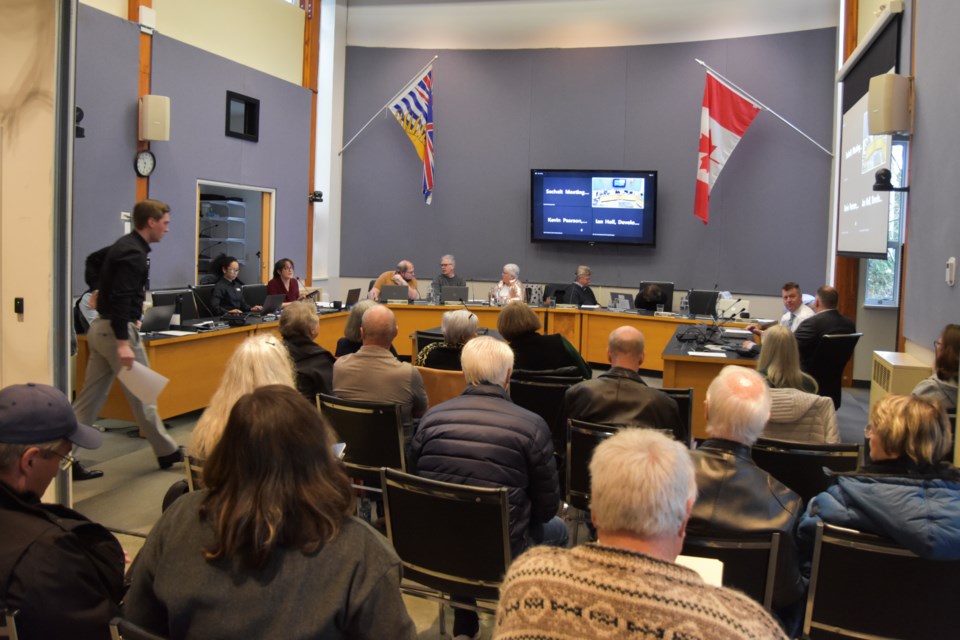District of Sechelt council chamber audience seats were full during the March 20 public hearing as residents and community representatives weighed in on the proposed Official Community Plan (OCP) amendment regarding floor area ratio (FAR). More than 20 Sunshine Coast residents attended the public hearing and more than six members of the public spoke to the council.
What is the proposed amendment?
Kevin Pearson, Sechelt's senior policy planner, said that this is one of the ways the district is creating affordable housing and addressing the “missing middle.”
The proposed amendment to the OCP would change how density is measured in the district, from the current units per hectare system to the floor area ratio system.
Floor area ratio uses the relationship between the amount of usable floor area a building has and the total area of the lot the building occupies to calculate density regulations, while units per hectare sets a hard limit to how many dwellings can be in a development.
“Within a building envelope, if you have units per hectare, you're constrained to say, four to eight units, but with floor area ratio, if you eliminate units per hectare, you might be able to squeeze six to eight units into what would normally be a fourplex,” Pearson said. “Maybe having to add an extra storey, from two to three.” He added that it allows for more flexibility and more options for the types of housing the district needs for the missing middle.
The bylaw includes getting rid of units per hectare as a measurement tool altogether.
Pearson added that over the last 10 years, Sechelt’s population has grown roughly 1.7 per cent annually. Based on this trend, staff projects a population increase of roughly 2,300 people, meaning the district needs to accommodate at least 100 units per year of varying types of housing.
Further reasons for this change are to align the district with provincial requirements and federal expectations for allowing higher density and to reduce the number of unnecessary OCP amendments for missing middle housing, Pearson said.
From the public
The resounding comment from the Sunshine Coast residents was that they simply did not understand the connotations of the amendment and therefore could not support it.
Candice Sayre, president of the West Sechelt Community Association (WSCA), said that residents are worried that local governments are not taking the time to provide clear, concise, explicit information that they can understand.
“[WSCA] has repeatedly asked for an open house or public information session so that the public can learn, see and understand how they will be affected: their property, their neighbourhood, their community,” Sayre said. “But nothing beyond that typical public hearing process has been scheduled.”
Catherine Hanson, chair of the Sechelt Community Association and Forum (SCAF), said that citizens deserve and want to know what is happening to their neighbourhoods.
“Understanding the language of plenaries can at times be akin to discussing quantum physics, string theory or black holes,” said Hanson. “Simple and clear communication is essential. At this point, it is not clear whether this is ‘an amendment for,' ‘a replacement of’ or an ‘update to’ the current OCP.”
Aidan Shirley of CityState Consulting Group was the sole voice of support among the public. He said implementing the FAR system would streamline the process of approving developments, citing that several developments that require an OCP amendment solely because of the units per hectare system.
“This is bringing unit sizes and alignment with the types of housing that the province is looking for, that the district is looking for, housing operators on the Sunshine Coast are looking for,” said Shirley.
Former Sechelt councillor Warren Allen, representing the Davis Bay Wilson Creek Selma Park Community Association (DBWCSPCA), said that council should take a step back with the amendment because of “apparent significant failures in policy, practice and communication.”
“As the West Sechelt Community and village were apparently the only associations who received this referral, either staff unwittingly failed to include all of the community associations, or council unknowingly, either breached or ignored their own policies,” Allen said.
Jordan Copp is the Coast Reporter’s civic and Indigenous affairs reporter. This reporting beat is made possible by the Local Journalism Initiative.



